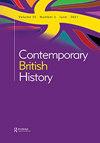危机时期的文化外交:军事独裁时期英国文化协会离开缅甸(1962-1966)
IF 0.5
2区 历史学
Q1 HISTORY
引用次数: 0
摘要
1948年,当缅甸独立时,英国殖民政府离开了缅甸,取而代之的是英国大使馆和英国文化协会中心,以建立新的外交关系。文化外交作为一种良好的、非正式的方式出现,以进一步推进大使馆的最初目标,即在殖民时代结束后促进缅甸与英国之间的和平和优先外交关系。在整个20世纪50年代和60年代初,英国文化协会向缅甸公众提供英语课程,并鼓励发展两国之间的学术伙伴关系。然而在1962年,奈温将军领导的军事政变推翻了总理吴努的民选政府,破坏了英缅关系。在外交事务中严格中立的名义下,奈温的革命委员会限制了所有外国文化使团在缅甸的行动,特别是他们向缅甸学生教授外语的能力,直到英国文化协会最终被迫关闭,并于1967年将其剩余的一些使团转移到英国大使馆。本文以伦敦国家档案馆收集的英国文化协会档案为基础,通过关注缅甸内部政治危机对英缅外交和文化关系的影响,考察了一场被迫的“外交离开”。本文章由计算机程序翻译,如有差异,请以英文原文为准。
Cultural diplomacy in times of crisis: the British Council’s departure from Burma during the military dictatorship (1962-1966)
ABSTRACT In 1948, when Burma became independent, the British colonial administration left the country and was replaced by a British embassy and a British Council centre, in order to establish new diplomatic relations. Cultural diplomacy appeared as a good, informal way of furthering the embassy’s initial goal of promoting peaceful and preferential diplomatic relations between Burma and Britain after the colonial era. Throughout the 1950s and early 1960s, the British Council offered English classes to the Burmese public and encouraged the development of academic partnerships between the two countries. Yet in 1962, a military coup led by General Ne Win overthrew Prime Minister U Nu’s democratically elected government and disrupted Anglo-Burmese relations. In the name of strict neutrality in foreign affairs, Ne Win’s Revolutionary Council restricted all foreign cultural missions’ actions in Burma, notably their ability to teach foreign languages to Burmese students, until the British Council was eventually forced to close down and transfer some of its remaining missions to the British embassy in 1967. Based on British Council archives gathered at the National Archives in London, this article examines a forced ‘diplomatic departure’, by focusing on the impact of the Burmese internal political crisis on Anglo-Burmese diplomatic and cultural relations.
求助全文
通过发布文献求助,成功后即可免费获取论文全文。
去求助
来源期刊

Contemporary British History
HISTORY-
CiteScore
1.40
自引率
14.30%
发文量
34
期刊介绍:
Contemporary British History offers innovative new research on any aspect of British history - foreign, Commonwealth, political, social, cultural or economic - dealing with the period since the First World War. The editors welcome work which involves cross-disciplinary insights, as the journal seeks to reflect the work of all those interested in the recent past in Britain, whatever their subject specialism. Work which places contemporary Britain within a comparative (whether historical or international) context is also encouraged. In addition to articles, the journal regularly features interviews and profiles, archive reports, and a substantial review section.
 求助内容:
求助内容: 应助结果提醒方式:
应助结果提醒方式:


